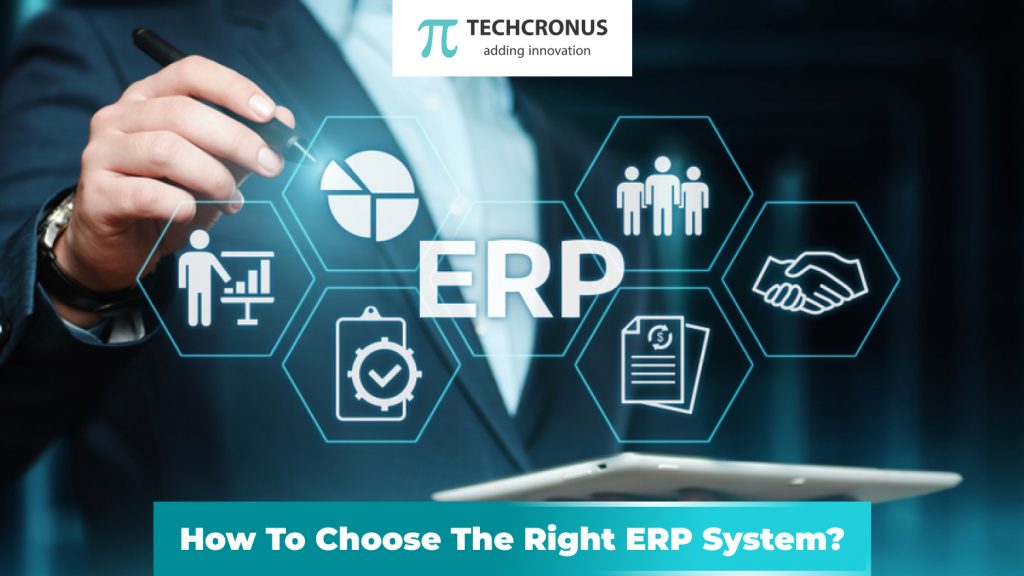How to Choose the Right ERP System?
Selecting an ERP System is no small decision.
As businesses aim for more efficient operations, there is a growing demand for enterprise resource planning ERP System software to optimize processes at the business application level. ERP software integrates various back-office applications, business processes, and workflows into a unified platform. This presents the potential for advantages such as enhanced data exchange, improved data quality and accuracy, and better administrative visibility.
However, many businesses make the error of choosing an ERP solution that doesn’t align with their company’s business model and objectives. It’s crucial to not only understand the fundamental aspects that should be prioritized when selecting an ERP platform but also to recognize the specialized features worth considering. This involves a thoughtful approach to choosing an ERP system that fits your business, encompassing both essential considerations and more specific requirements.
Essential Features you need in an ERP solution
ERP solutions are designed to bring together applications and processes across different business scenarios. To effectively enhance visibility and performance for various departmental workflows, ERP platforms should consistently incorporate the following fundamental functionalities:
- Seamless connections to other enterprise applications, either through built-in compatibility or application programming interfaces (APIs).
- Management and automation of workflows.
- Business intelligence (BI) and the ability to analyze data.
- Visualization of data and generation of reports.
- Real-time tracking dashboards for administrators.
- Customizable and detailed user and administrative access permissions.
- Strong databases and storage capabilities.
- Assistance with compliance and policy management.
Core modules in an ERP solution
While certain ERP Systems focus solely on delivering essential functionalities for managing back-office processes, many ERP platforms adopt a more comprehensive strategy. These platforms present modules tailored to diverse industries and business scenarios, allowing for the addition or removal of modules as required. If your business operates within a specialized industry, it’s important to consider the necessary modules and confirm their availability with your chosen ERP vendor. Here are some common ERP software modules:
- Financial and accounting management
- Management of e-commerce operations
- Oversight of patient, staff, and inventory in healthcare settings
- Handling supply chain and order procedures
- Management of inventory and resources
- Customer relationship management (CRM) and automation of marketing activities
- Human resources and workforce management, encompassing payroll administration
- Management of manufacturing processes and facilities
Best practices for selecting an ERP System
Simply because an ERP platform has a good reputation or positive reviews doesn’t automatically make it the perfect fit for your business. To ensure you choose the most suitable ERP system for your organization and its existing technologies, follow these best practices and steps during the selection process:
1. Establish an ERP Research and Selection Team:
When evaluating and selecting an ERP system, avoid working in isolation. Form a team that includes IT professionals and key stakeholders from various departments who will be using the system. This diverse group can offer insights into daily operations, current processes, inefficiencies, and essential requirements for the new platform.
2. Assess Your Current Enterprise Applications and Workflows:
Before committing to an ERP system, assess the strengths and weaknesses of your existing business processes and applications. Conduct a comprehensive network audit to identify bottlenecks, security concerns, outdated tools, and unnecessary silos.
3. Prioritize Data Quality Enhancement:
Before migrating to a new system, address data quality issues to prevent replicating errors and inefficiencies. Invest in data cleansing and quality improvement tools to enhance the accuracy and relevance of your data. This step not only saves time and money but also provides insights into data usage.
4. Select Relevant ERP System Modules:
Each business requires specific ERP modules to effectively manage its operations. Identify your organization’s pain points and prioritize the modules that address these challenges. Avoid spending on modules that won’t contribute significantly to your team’s productivity.
5. Consider Your IT Team’s Expertise:
Evaluate your IT team’s technical proficiency and expertise. Depending on their skill levels, decide whether a user-friendly, pre-configured ERP or a more customizable, open-source solution is suitable. Research the available customer support options for your chosen ERP software.
6. Prepare for Product Demos:
Schedule a product demonstration with a customer experience specialist from potential ERP vendors. Before the demo, create documentation and a list of pertinent questions to ensure that the demo covers all the essential aspects you need to make an informed decision.
Choosing the right ERP System for your business
Selecting the appropriate ERP system for your business is a decision that holds substantial influence over essential users, applications, and daily operations. The manner in which your team configures and deploys this ERP platform can significantly impact your entire organization’s trajectory toward success. By dedicating the required time and effort to selecting the right ERP system, and subsequently incorporating its modules across multiple departments, you lay a strong foundation for your business’s achievements.
It’s imperative to thoroughly consider the available features within your chosen platform, identify the individuals and resources that will facilitate the implementation process, and assess how well the ERP system can adapt to your evolving needs in the long run.
If you have questions about ERP software, please don’t hesitate to contact our team of ERP specialists.
